Made in America. Stayed in America. These 5 sma
Post# of 63902

Made in America. Stayed in America.
These 5 small businesses all make their products in the U.S. and are committed to keeping things that way, despite the lure of outsourcing.
Textile mill that's growing
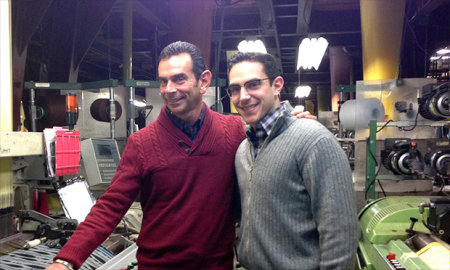
Based in: Garfield, N.J.
# of employees: More than 100
Few textile manufacturers are still operating in the United States, since cheaper imports make it hard for them to compete. But business is booming lately at the Wearbest Sil-Tex mill in Garfield, N.J.
The firm's sales were up 52% last year, as the company has found new customers. Wearbest fabrics have been used for upholstery and drapery at luxury hotels, large restaurant chains like California Pizza Kitchen and Starbucks (SBUX), and even the White House.
A commitment to keeping the firm's goods "Made in America" is central to the company, said owner Irwin Gasner. His grandfather started the business in the 1940s, opening a mill in East Rutherford, N.J. that made silk linings for high-end men's suits. After World War II, the business shifted its focus to making upholstery and other decorative fabrics for the home.
The firm did well, and after Gasner took the helm in 1980, he moved to a bigger facility. But then, on Labor Day in 1985, a fire burned the mill to the ground. Despite the huge setback, the firm got loans that helped it get back in its own mill six months later. The recession delivered another blow: Sales dropped 40% and in 2009, the mill laid off half its employees.
"It hasn't been an easy ride but we're back on track," said Gasner. To stay relevant, the firm focuses on creating innovative fabrics. Its latest invention: environmentally friendly, high-performance fabrics designed for high-traffic areas, like seating in hospital waiting rooms.
"I constantly tell my team that there's no reason to exist if we can't get even better," he said.
Making American blue jeans for 110 years
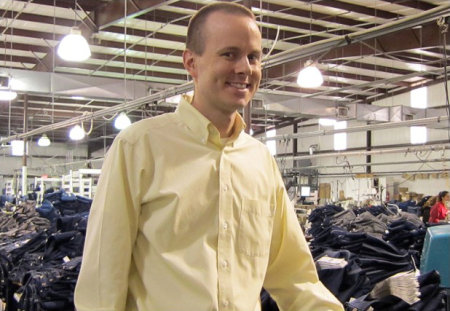
Based in: Shawnee, Okla.
# of employees: 80
Blue jeans are an American classic, but they're rarely made in America anymore.
A big exception: Round House Manufacturing, which makes blue jeans, denim overalls, and denim kids' clothing in the same railroad town where it started 110 years ago. That makes it the oldest operating manufacturer in Oklahoma, according to owner David Antosh.
Antosh's grandfather bought Round House in 1964, when it was making denim overalls for railroad workers and khakis for U.S. soldiers. His father took over the business in the 1970s, expanding the product line to jackets and bellbottoms. "But we still kept everything made in America," said Antosh. "We take great pride in that."
Its cotton comes from Texas and North Carolina, zippers and buttons come from Georgia, and no component is imported, he said. The average price of Round House jeans: $30.
"People ask how we keep our prices so reasonable," said Antosh. "We have very experienced and productive employees who work really fast and make products very quickly."
Today, Round House supplies its denim wear to Wal-Mart (WMT), army surplus, industrial and farm supplies stores nationwide. Lately, its biggest fans are overseas, specifically in Japan, where Round House overalls are considered high fashion. Thanks to that demand, the company is considering adding a third plant, Antosh said.
Made in America was his first choice
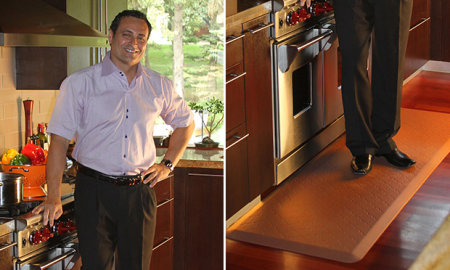
Based in: Troy, Mich.
# of employees: 180
Most floor mats sold in the U.S. are made in China. So when Daniel Bouzide decided to start a company that would make high-quality floor mats in America, he knew the odds were stacked against him.
But Bouzide had one big advantage: With a decade of experience as a manufacturing rep in the flooring industry, he knew what customers liked and disliked about existing mats.
"I saw an opportunity to create a high-quality floor mat that [would offer] consumers more than the obvious," he said.
He spent six months researching and developing a line of therapeutic, anti-fatigue, antibacterial floor mats for home and business use. In January 2005, he launched his company, Smart Step, which began to manufacture WellnessMats in St. Louis.
"I wasn't convinced that I would save money or get the best quality by going abroad," he said. "My goal all along was to make the absolute best product."
The mats, which sell for $195, are more than double the price of competitors'. But because higher-quality mats last much longer, his firm's mats are more cost-effective in the long run, he said.
WellnessMats are sold at more than 700 retailers nationwide. Since 2008, the company has enjoyed 30% to 35% annual sales growth and, Bouzide added, "we're quite profitable."
Trying hard to stay "Made in America"
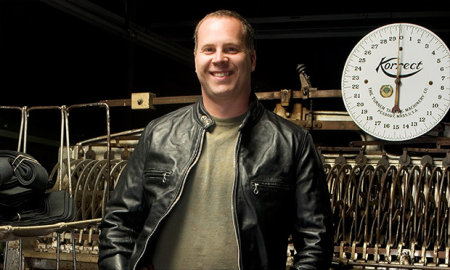
Based in: Union, N.J.
# of employees: 100
A century after it was founded, Schott Bros. Inc. is still committed to making its iconic jackets in the U.S. It even sources American cowhides for its leatherwear, said Jason Schott, owner and chief operating officer.
Schott's great-grandfather started the business in New York City in 1913, selling fur-lined raincoats door to door. As its product line evolved, the firm introduced a black leather motorcycle jacket called "The Perfecto."
"My great-grandfather added a zipper to the jacket and it took off," said Schott. The jackets' popularity soared as celebrities like Marlon Brando wore them. Over the years, the company also supplied American-made leather jackets and peacoats to the U.S. Army. Schott later added nylon jackets and sweaters to its product line, but those are made overseas because finding a U.S. manufacturer proved too difficult.
In early 2000, sales slowed, the business became unwieldy and workers were laid off, said Schott. But as enthusiasm for goods made in the U.S. has surged, sales have revived.
Continuing to manufacture its jackets in the U.S. is tricky, because "we're also losing American suppliers of leather, wool, zippers and trims," said Schott. But, he added, "that's still our competitive advantage because it allows us to make products quickly."
127-year-old furniture maker needs lifeline
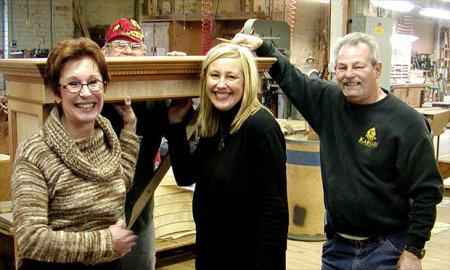
Based in: Evansville, IN.
# of employees: 30
Karges Furniture Co. considers itself a true all-American small business that's beaten the odds and survived even after most of its peers have gone out of business or outsourced to China.
But now, the 127-year-old handcarved furniture maker is desperate to stay alive. "The recession hurt us badly and we're barely hanging on," said Joan Karges Rogier, owner and president. In fact, Rogier is banking on Chinese consumers to become the lifeline her family business badly needs.
Last year, for the first time, the company shipped a container of American furniture to China for a trade show. "We took five months to get the products ready," she said. Her hope is that Chinese consumers fall in love with her furniture and orders start rolling in soon.
The irony of the situation isn't lost on Rogier, whose great-grandfather founded the company in 1886 in a river port town of Evansville, Ind. Once a thriving region for furniture makers, Evansville lost almost all of that industry as cheaper furniture from China and elsewhere started to flood the U.S. market.
Still, Karges hung on, hitting peak sales of $10 million in 2000 and boasting celebrity clients like Carol Burnett, Elizabeth Dole and Aretha Franklin. The MIddle East was a big market for its furniture, but sales dropped after 9/11. By 2008, Karges had 30 employees, down from 130, and sales had shrunk to under $4 million.
"We're doing everything we can," said Rogier. "Maybe we won't make it and it will be the saddest thing after all these years."
 (0)
(0) (0)
(0)